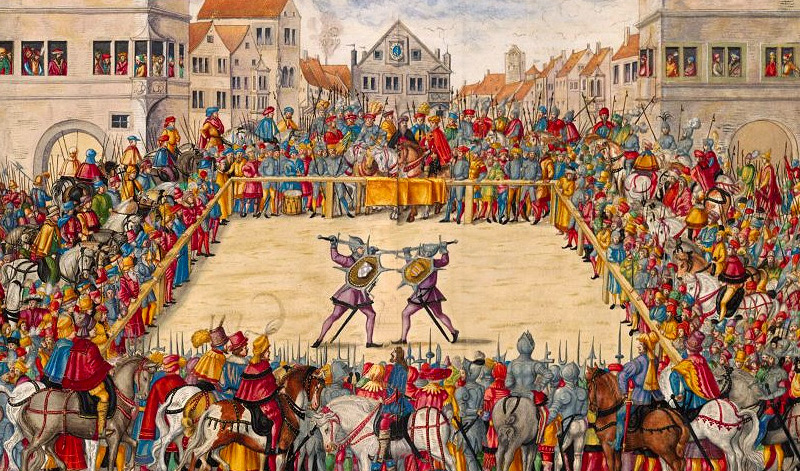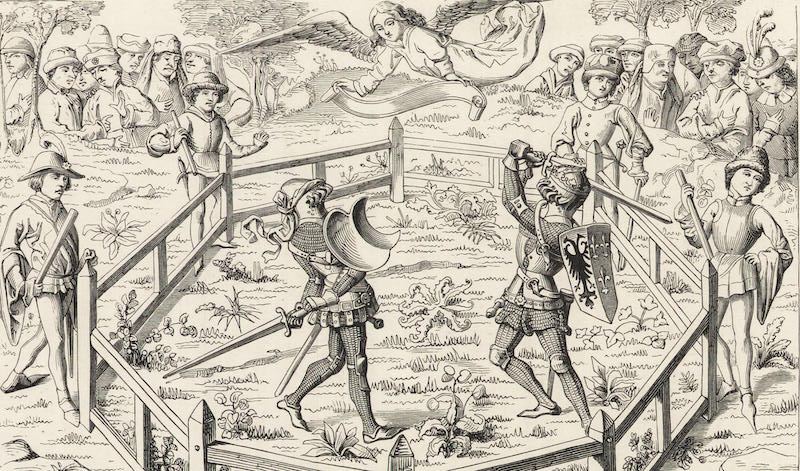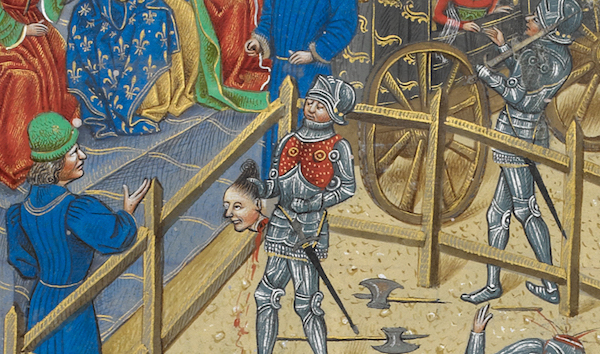Everyone who watches Game of Thrones is familiar with trial by combat: settling legal affairs by judicially-sanctioned duels. But what did these events look like in the real world? Why did people sometimes prefer the dueling field to the courtroom? And how can we use these events at the gaming table?

First, some definitions. The medieval world deferred to judges for both criminal trials and lawsuits. These judges initially were usually the local lord, but a separate class of judges developed gradually. Criminal cases tried people for crimes: theft, murder, and the like. Lawsuits settled disputes between individuals, often over land ownership. There were three ways to establish guilt. The first was by evidence, eyewitness testimony, and sworn statements. This method was preferred whenever possible.
When evidence could not be found or witnesses disagreed, the question was settled by ordeal or by trial by combat (‘judicial combat’). In ordeals, like the ordeal of hot iron, the accused would undergo some sort of physically painful test. If a wound developed, she was guilty. In trial by combat, the two disputants or their stand-ins would fight. The side that won the battle won the case. In both ordeals and judicial combat, the idea was that God would protect the innocent, but permit the guilty to come to harm. This idea was theologically contentious. The Church actually disagreed with it so strongly they forbade clergymen from undergoing either. Nevertheless, secular authorities (lords and knights) often used ordeals and judicial combat when guilt was hard to determine.
Combatants in judicial combat might be armed, unarmed, or armed with rocks or sticks. Similarly, they might be armored or unarmored, mounted or afoot. Traditions varied across place and time. What mattered was that both sides were equal. Consequently, serfs could not challenge freemen, lepers could not challenge the healthy, and bastards could not challenge the legitimately born. Women usually couldn’t challenge men, except in certain cases were wives could challenge their husbands. The difference in strength between the sexes was resolved by a handicap, like making the husband stand in a hole.
If one side was barred from fighting, they could hire a champion. In England, parties in lawsuits were actually required to use champions. Champions might be vassals or retainers of the disputants or they might be professionals, killers for hire. In England, there was even a special class of champions called ‘approvers’. These were convicted felons who were offered a pardon if they would serve as champions and fight other accused felons. Courts often punished champions who lost. Since the champion had defended someone who was proven guilty, he might have a hand or foot amputated. Sometimes, losing champions were hanged.
Trial by combat was particularly associated with disputes over land ownership. In an era before everyone had a written deed to their land, it was often hard to prove who owned what. Without evidence, courts had to resort to ordeal or judicial combat. Combat was often preferred because, in the era of the Medieval warrior aristocracy, land was often held by right of conquest. Lands were won and held by bloodshed. This was especially the case in England, where the Norman aristocracy traced its lineage back to knights who fought for William the Conquerer, and earned their fiefs with their swords. Judicial combat was thus more appropriate for land disputes than ordeals.

The following three examples of judicial combat give a good sense of the practice.
Near Worcester, England, in the early 1200s, a man named Thomas had an affair with an unnamed married woman. He eventually terminated the affair, and when her husband died, he declined to marry her. Instead, she married a man named George. George found out about the earlier affair and quarreled with Thomas. George hit Thomas twice with a big stick. Thomas defended himself with an axe, and drew a thin line of blood. George ran off, claiming Thomas had violated the king’s peace. In 1221, George brought a suit against Thomas, and the two agreed to trial by combat. George thrashed Thomas, and partially tore out one of Thomas’ eyes. Thomas was thereby proved proven to be the guilty party, and could have been hanged for his crime. The court decided on mercy instead, and merely ordered Thomas be castrated and fully blinded.
In 1456, an English fisherman named Jamys Fyscher claimed that Thomas Whythorne, a thief and ‘approver’ (see above) falsely accused him of being an accomplice. The judge settled on trial by combat, with both men armed with ash staves. Fyscher broke his stave early in the combat, so the judge disarmed both of them. The trial continued with much biting and eye-gouging until Whythorne cried for mercy. The judge gave both sides one last chance to come clean, and Whythorne confessed he had falsely accused Fyscher and twenty-eight other man. Having confessed to his crimes, Whythorne was hanged.
In 979 in Germany, a man named Waldo brought a charge (now lost) against Count Gero of Alsleben. EmperorOtto II ordered trial by combat. During the fight, Waldo suffered two neck wounds and Gero suffered a concussion so bad he had to quit the field. While resting after the fight, Waldo dropped dead of his neck wounds. Nonetheless, because Gero left the field first, he had lost. Despite a remarkable lack of evidence, Otto had Gero beheaded.
Trial by combat died out slowly. In 1455, the duke of Burgundy attended a judicial combat largely because they were rare enough to be interesting. The last trial by combat in England occurred in 1492, but the practice was not formally outlawed until 1819.

For your PCs, acting as a champion may be a decent way to earn some money (at great risk) or to ingratiate themselves with the powerful NPC they’re championing.
Alternately, perhaps a criminal the party caught is going to trial. She bribes a few witnesses to contradict the PCs’ story. With the evidence muddled, the judge orders trial by combat. The PCs can’t participate due to a technicality (perhaps due to their social station), and the criminal’s champion wins the duel. The PCs have to watch as their champion has his hand amputated for defending the wrong side, and the criminal goes free. What does the party do?
If the PCs are landowners or are building their own castle, perhaps their right to that land is challenged by a neighboring landowner or lord. He claims their land is his, and always has been. If the PCs were granted the land by a higher authority, their neighbor disputes the grant – no one can give away land that was already given away centuries earlier! And if the PCs just carved their fief out of the wilderness, they may feel like they don’t have any options. But in preparing for the trial, they learn their neighbor probably doesn’t have a written deed to his own land. His family’s claim to it is based on tradition and word of mouth! This dispute will likely go to trial by combat. If the PCs lose, they’ll be evicted and punished appropriately for the setting. If they win, the neighbor will probably be punished for bearing false witness. The PCs may push for that punishment to be that his land is given to them.
–
Sources: Medieval Justice: Cases and Laws in France, England, and Germany 500-1500 by Hunt Janin and Look After Your Champions by Colin Wixted.






